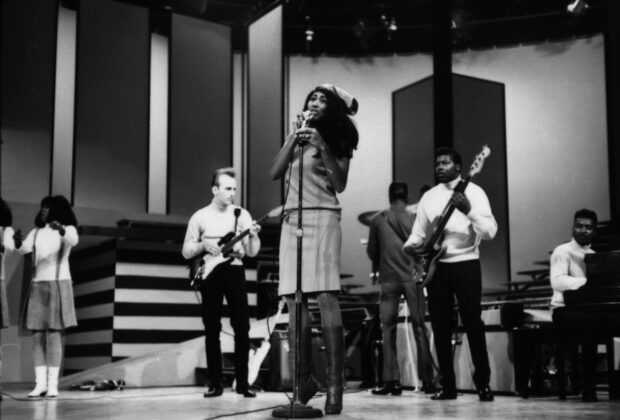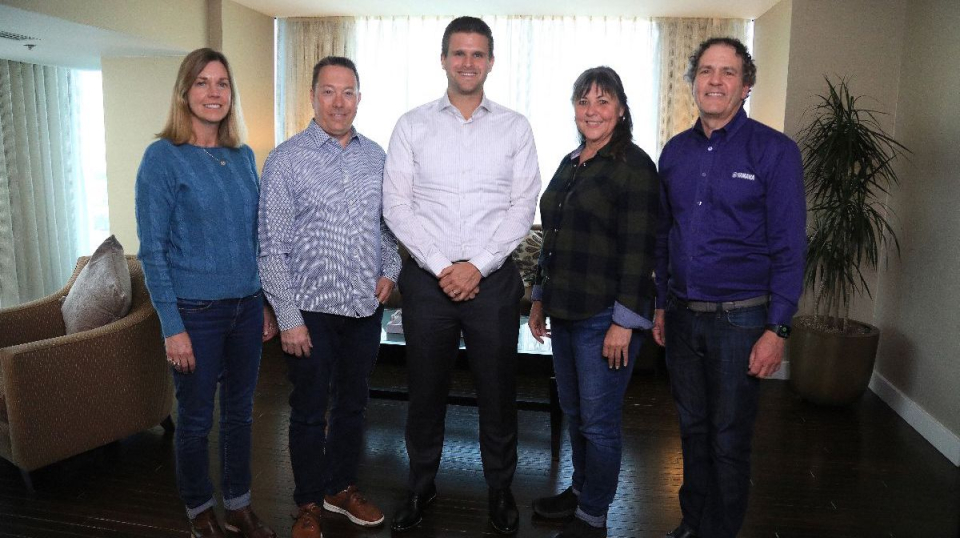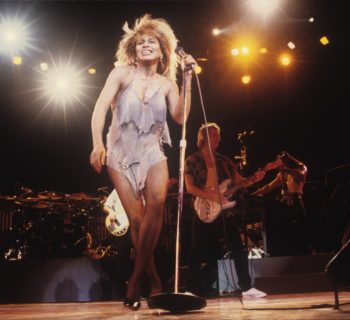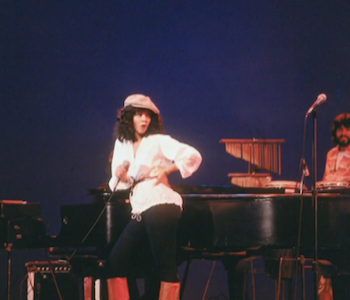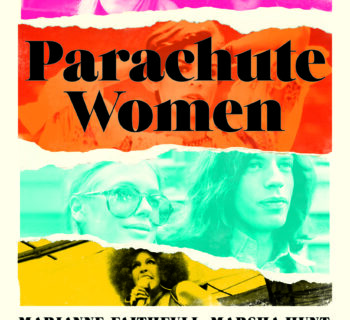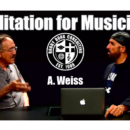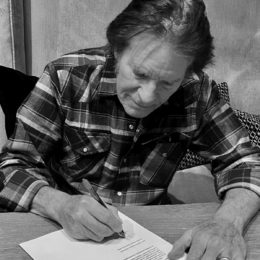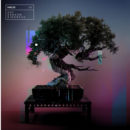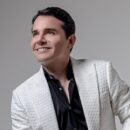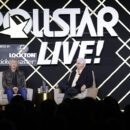"Some people point to JFK's assassination or the Beatles on The Ed Sullivan Show or maybe Dylan going electric as the birth of the mythic sixties, but for me it's the ninth inning of The T.A.M.I. Show all the way. When the Rolling Stones hit the stage, it's like you can feel the whole of American culture pivot in a way that's so dramatic it borders on complete confusion, a pandemonium of the spirit.
"And here's the thing: Everybody that performs beforehand is wonderful, more than wonderful, the most beautiful blend of post-war All-American Black and White musical exuberance.
"In fact, that's part of what makes the Stones' entrance such a jarring, one-two knockout punch--it would have been a top notch variety show without them, a magical time captured...but one half-minute into 'Round and Round' you know you've entered a different space for which a whole new something will be required. Call it erotic, demonic, primordial, orgiastic, anarchic--call it what you want but don't call it show biz because there's no telling what could happen. Well...the sixties happened.
"The T.A.M.I. Show is a before and after deal. The teenagers of America will never know pure innocence again." ----Novelist Daniel Weizmann, author of The Last Songbird.
Fans of classic rock and soul rejoiced when the legendary concert Steve Binder-directed film T.A.M.I. Show made its DVD debut on Shout! Factory in 2009. It subsequently shipped to retail outlets as a Blu-ray, along with its long-lost—and much requested—follow-up, The Big TNT Show, directed by Larry Peerce, on December 2, 2016, as part of the 2-disc Blu-ray set T.A.M.I. Show / The Big T.N.T. Show Collector's Edition, issued from Shout! Factory. The Big T.N.T. Show was also released as a stand alone DVD on the same day.
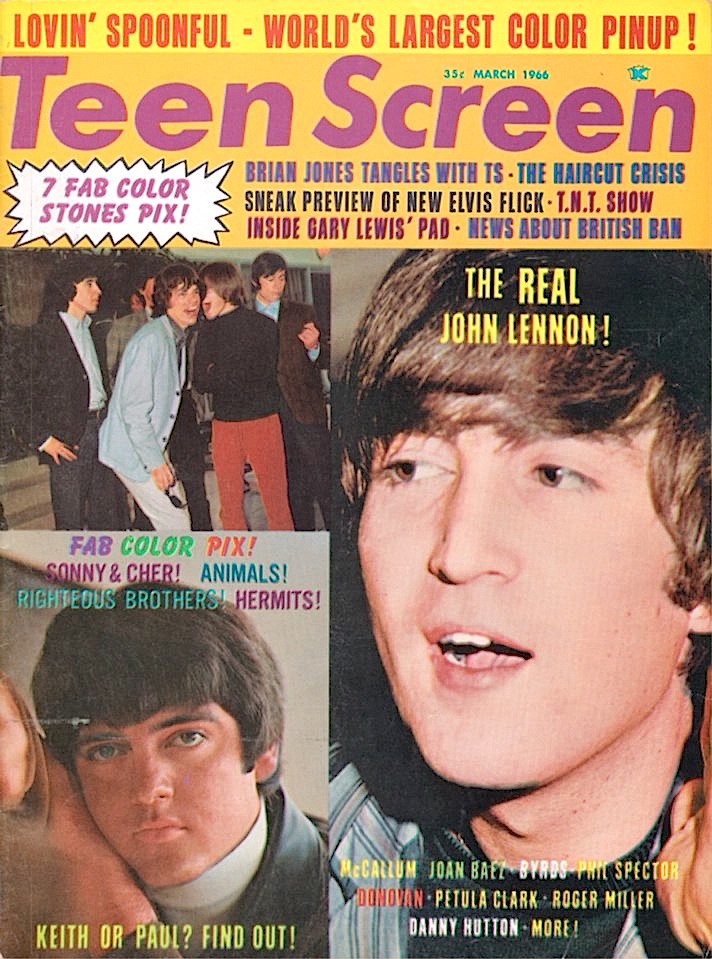
The T.A.M.I. Show is one the most heralded rock events ever captured on film, right up there with producer Jack Good and the Rolling Stones introducing Howlin' Wolf on the 1965 ABC-TV network music series Shindig!, the 1964 concert known as T.A.M.I. Show [Teenage Awards Music International] presented a lineup like no other, the Rolling Stones, James Brown and the Famous Flames, the Barbarians, Billy J. Kramer and the Dakotas, Gerry and the Pacemakers, the Beach Boys, Marvin Gaye, the Miracles, the Supremes, Chuck Berry, and Lesley Gore. The hosts were Jan & Dean.
The package contains all the bonus features from the T.A.M.I. Show DVD, plus new interviews with The Big T.N.T. Show performers singer Petula Clark, MFQ's Henry Diltz and the Lovin' Spoonful's John Sebastian. The product is mastered from a High-Definition transfer.
The Big T.N.T. Show was filmed in Hollywood on Sunset Blvd. on November 29, 1965 and stars some of the biggest recording artists of the day, including the Byrds, in their original line-up of Gene Clark, David Crosby, Chris Hillman, Michael Clarke, and Roger McGuinn, perform two # 1 hits, “Mr. Tambourine Man” and “Turn! Turn! Turn! (To Everything There Is A Season.”)
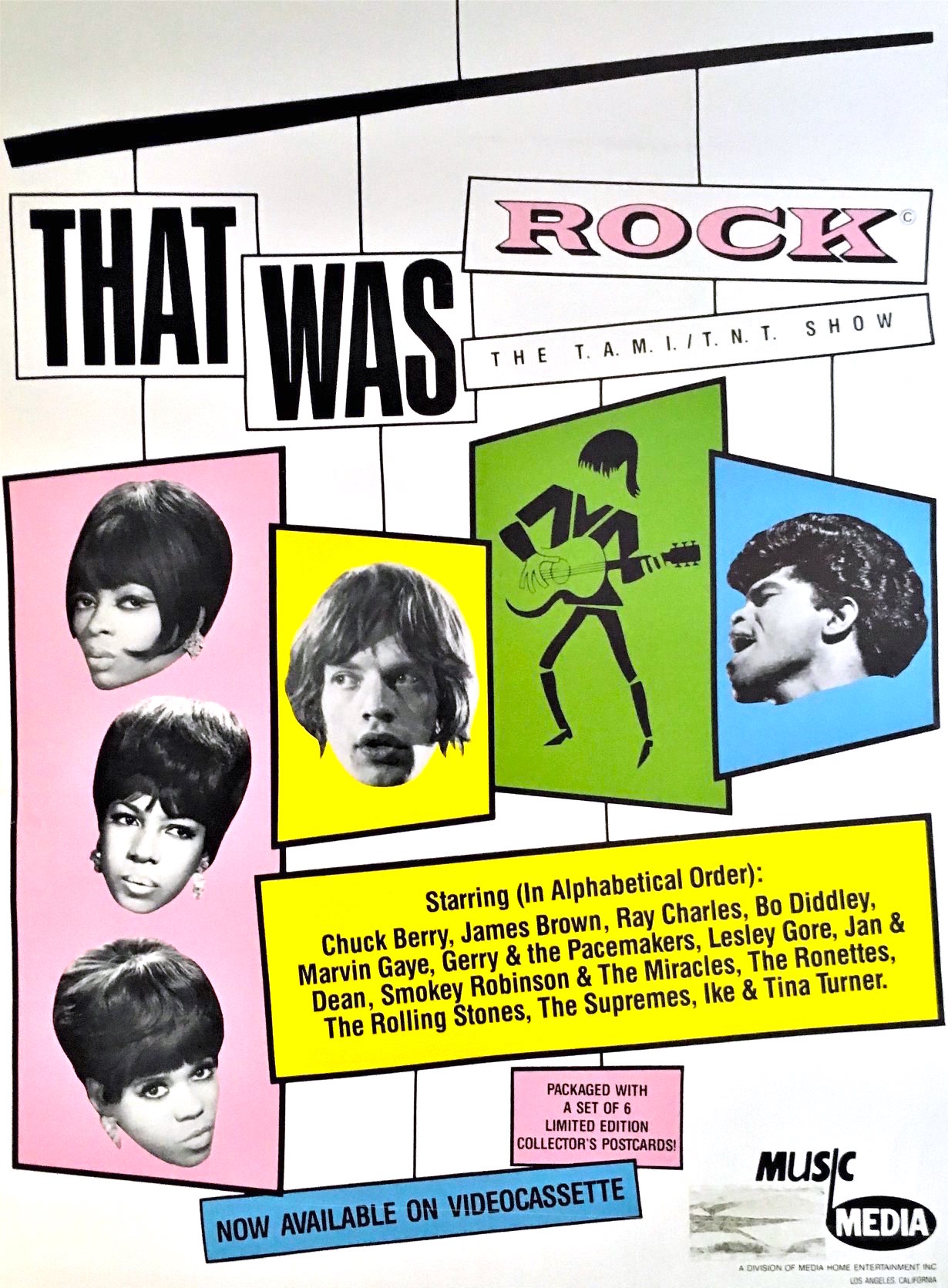
Originally billed as a companion piece to The T.A.M.I. Show after that culture-shifting success, The Big T.N.T. Show holds up as an essential time capsule from its day. It is often in the shadows of the epic T.A.M.I. Show.
David McCallum, a rising star appearing in the new TV series The Man from U.N.C.L.E., was tapped to emcee The Big TNT Show. Footage also includes shots of the Hollywood haunts Chateau Marmont, Ben Frank’s coffee shop, the Knickerbocker Hotel, and The Trip nightclub.
Don Randi was the musical director for The Big T.N.T. Show. It was produed by Phil Spector, and directed by Larry Peerce. Initially distributed in 1966 by American International Pictures, Peerce in 1964 had directed the groundbreaking drama One Potato, Two Potato, a study about an interracial marriage between white divorcee, played by Barbara Barrie, who earned the Best Actress award at the Cannes Film Festival in 1964, and a black office worker portrayed by Bernie Hamilton. The One Potato, Two Potato screenplay was written by Oriville H. Hampton and Raphael Hayes, was nominated for Best Original Screenplay at the 1964 Academy Awards.
In 1969, Peerce directed the acclaimed Goodbye, Columbus, an adaptation from the Philip Roth novel. He then directed Two Minute Warning in 1976. The movie starred Charlton Heston, John Cassavetes, David Janssen, Jack Klugman, Martin Balsam, Beau Bridges, Gena Rowlands, Brock Peters, Walter Pidgeon and Joanna Pettet. Former professional football players Frank Gifford and Joe Kapp, as well as poet/actor Harry E. Northup are in the cast.
The Big T.N.T. Show set location at the Moulin Rouge on Sunset Blvd. was where scenes of the Ross Hunter-produced and Douglas Sirk directed Imitation Of Life motion picture starring Lana Turner, Sandra Dee, Susan Kohner, Juanita Moore and John Gavin, were lensed.
Many girls in my Los Angeles junior high school homeroom class were invited to the affair while the boys were encouraged not to attend or be seat-fillers.
“The then King-Of-All-Media-in-waiting Phil Spector not only fully launches action with the ultra Modern Folk Quartet's ‘This Could Be The Night’ – setting composer Harry Nilsson's career on its way in the process,” underscores writer and archivist Gary Pig Gold, “not at all coincidentally – but stuck all the way round to produce the T.N.T. to boot; glimpse his ivories right beside righteous Joan Baez f'rinstance.
“Uncle Phil also graciously allowed Ronnie out to front her fabulous Ronettes ...while keeping both ears keyed onto Ike and especially Tina Turner too, you can bet.
“Meanwhile, a still freshly-flying Byrds were counseled backstage by no less than Roger Miller to stick to their countrypolitan guns, Petula Clark can be seen serenading Sky Saxon (as a somewhat dejected F. Zappa sulks elsewhere within the Moulin Rouge), and ingenious-as-ever Ray Charles adds full frug to his American International Ingredients for Soul. Dump into the gloriously mono mix Donovan, Diddley, Illya Kuryakin and a positively scene-stealing – thanks to Canucklehead-in-residence Zal Yanovsky, naturally – Lovin' Spoonful and, lighting its stick and letting off one brash bang indeed, The Big T.N.T. Show in many ways somehow even managed to one-up its big T.A.M.I.brother!”
During The Big T.N.T. Show, Ray Charles gives a rousing performance of “What’d I Say” and “Let the Good Times Roll.” A sultry performance by the Ronettes on “Be My Baby” is met with impassioned screams from the audience; the Lovin’ Spoonful perform their Top 10 hits “Do You Believe in Magic?” and “You Didn’t Have to Be So Nice”; and Bo Diddley delights the crowd with “Bo Diddley” and “Hey, Bo Diddley.”
To close the show, the Ike & Tina Turner Revue give an electrifying recital, spotlighting “I Think It’s Going to Work Out Fine” and “A Fool in Love.”
Also on the stage at the tapings were Petula Clark, performing her No. 1 hit “Downtown”; Roger Miller, playing his biggest hit, “King of the Road”; Donovan, opening his set with Buffy Sainte-Marie’s “Universal Soldier”; and the reigning queen of folk, Joan Baez, reflecting the continuing popularity of the genre as the Vietnam War escalated. Phil Spector also played piano for Joan Baez’s rendition of the Righteous Brothers’ “You’ve Lost That Lovin’ Feelin’.” Don Peake's guitar augmented the duo of Phil and Joan. .
Donovan would remain in Hollywood after the taping, and would record "The Trip," "Season of the Witch" and "Celeste" at the Columbia studios on Sunset Blvd. later sequenced into his Sunshine Superman album.
In my 2007 interview with Donovan, he recounted his 1965 visit to Hollywood.
" LA TV was a bit diff from British Telly, but the elements were the same. Hollywood A Go Go, Shindig! and other little TV Shows had the 3 dancers, and I had the shades on. Gypsy and I smiling at it all and the craziness. On the street of course the girls still in bobby sox and pony tails and the guys in plaids shorts and crew cuts, that was to change. We were treated like visitors from another planet.. The British Invasion...but the Planet we were from was Planet Bohemia, and soon it would change the way youth saw so-called reality.
"In May of 1966, I played a week at The Trip club on Sunset. All Hollywood turned up. New pals. I meet The Mamas and The Papas and Cyrus Faryar who played the wonderful electric violin on 'Celeste' when I recorded it in CBS Studios."
Performing to the side of the stage in between acts, but not seen in The Big T.N.T. Show film, were the Modern Folk Quartet. A group of songwriter/producer Chip Douglas, future Lovin’ Spoonful member Jerry Yester, rock photographer Henry Diltz, and songwriter/musician Cyrus Faryar, with session player “Fast” Eddie Hoh on drums. The band closed the evening with the show’s Harry Nilsson-composed theme song “This Could Be The Night.”
“The MFQ was working with Phil Spector during the year of 1965, and we were scheduled to have a slot on The Big TNT Show," mentioned Henry Diltz in a 2010 conversation inside his photography studio. "However, we just ended up playing live at various locations between the acts and stage setups.
"After February 1964, the Beatles changed everything. They took our Everly Brothers harmony and put it together with that skiffle music and came up with a new joyful thing. As folk musicians in early 1964 when we heard and saw them on The Ed Sullivan Show. They had an electric bass. We had a standup bass. We now wanted to make joyful music and we needed to get an electric bass and trade in our upright bass. So did every other folk group, like the Byrds and then Buffalo Springfield."
At The Big TNT Show, the Byrds played three songs, including two Bob Dylan-penned tunes, "Mr. Tambourine Man" and "Chimes of Freedom."
In 2007 I interviewed Roger McGuinn and Chris Hillman of the group about their 1965 spot on The Big TNT Show.
"The Byrds do Dylan," underlined Chris Hillman. "It was a natural fit after ‘Mr. Tambourine Man’ was successful. Roger (then Jim) almost found his voice through Bob Dylan. In a way. Literally voice through Bob Dylan in a sense. And then we start doing some Dylan stuff. ‘Chimes of Freedom.’ Great song."
"Dylan’s stuff is brilliant," stated McGuinn. '"Chimes of Freedom’ we did earlier at Ciro’s nightclub, and to this day it’s still in my own repertoire. I think it’s a great song. I love the poetry and imagery of it, you know, and it has some political feeling, but it is ambiguous. You can read whatever you want into it. I coined the term that he was the 'Shakespeare of Our Time.' It was like knowing Shakespeare here. Dylan was carrying on Kerouac and Ginsberg. The baton had been passed. I remember Ginsberg said, 'I think we’re in good hands.'
"We sang together well. I give the credit to [David] Crosby. He was brilliant at devising these harmony parts that were not strict third, fourth or fifth improvisational combination of the three. That’s what makes the Byrds’ harmonies. Most people think it’s three-part harmony, and it’s two-part harmony. Very seldom was there a third part on our harmonies."
Frank Zappa, Sky Saxon, Mary Hughes, Rodney Bingenheimer, Joey Paige, Johnny Legend and Ron and Russell Mael [later of Sparks] are shown on screen in The Big T.N.T. Show audience.
"I went to the taping. There was an open-door policy,” volunteered Bingenheimer, now a deejay with Sirius/XM. “I might have gotten tickets at Wallichs Music City on Sunset and Vine.
"Phil Spector was around. Backstage there was food and all the cool bands from the Sunset Strip were there. This was the event of the sixties in a theater with a revolving stage.
"I spent some time with David McCallum. We talked about music. His father was a classical musician in England. I was introduced to Donovan. And I sat in the middle of the audience when he sang on a stool. It was cosmic!
"The Ronettes were amazing. I loved Ray Charles. To this day, his LP, Ray Charles Sings Country and Western is one of my favorites,” he happily confessed.
"We were watching this mind-blowing show in color but we knew the movie from it was going to be in black and white. What was really nice about the whole thing, and this what Hollywood was like during 1965-1967, was that many of the acts at the show hung out in the lobby and talked to fans and signed every autograph. It was incredible.
"Man, I have been waiting a long time for this official retail release."
“We did The Big T.N.T. Show with Phil,” offered keyboardist Don Randi in a 2008 interview with me. “And, on all our dates, we all could read, except maybe a few of the guys who were brought in as players and specialists. All the guys could always read chord charts. That’s for sure. I had Barney Kessel and Don Peake on The Big T.N.T. Show.
“My guys in the studio could play live anywhere," acknowledged Randi. "They were capable musicians. The Big T.N.T. Show was fantastic because of Phil. And he gave me the opportunity, ‘cause otherwise I could have taken another date. But when Phil calls, he was ‘first call’ for me. If I were going to do something else many times I would move things around to accommodate him.
Randi’s principal stagehand was Robert Marchese, a record producer, who later won a Grammy for producing the first live Richard Pryor comedy album from Doug Weston's Troubadour club.
Marchese had previously engineered some sessions for Spector and Randi. In January 1964, Marchese and Spector schlepped out to the Long Beach Civic Auditorium to watch a Rolling Stones concert, supported by the Byrds.
During 2023, Marchese detailed a conversation he witnessed between Spector and Ray Charles.
"Don Randi got me the gig as his assistant. I was setting up the stage and working with the orchestra in the pit.
"The arranger/producer) Arif Mardin was there and gave me a copy of the Otis Redding album, Otis Blue. I saw Joe Adams, who was a well-known radio DJ in L.A. (The Mayor Of Melody) and an actor (Carmen Jones, among other credits).
"He was also Ray's right hand man. I told Joe I wanted to shake hands with Ray Charles. He said ‘sure.’ I said hello to Ray, and then he motioned to Joe and me to take him to ‘meet’ Phil Spector, who was overseeing the whole ball game. The Byrds were setting up. Ray says to Phil, ‘Are you Mr. Phil Spector?’ ‘Yes.’ ‘Are you the Boy Genius?’ ‘Yes.’ ‘Are you the inventor of the Wall Of Sound?’’ ‘Yes.’ ‘Are you the guy who had over 20 hit singles in a row?’ ‘Yes’" ‘Then Mr. Spector, how come there's no toilet paper in the bathroom?’"
Guitarist Don Peake, formerly with the Everly Brothers 1961-1963, and heard on many Spector 1964-1966 recording sessions, along with backing singer Marilyn McCoo, future member of the Fifth Dimension, were in the Ray Charles band.
"While filming with Spector and Joan Baez, we took a break and went outside the Moulin Rouge," reflected Peake in 2023. "We were walking back after a quick meal and noticed that the big thick front glass doors were opening and closing in time to bow to Bo Diddley's rhythms, because he was pumping so much air."
Portions of this article were preiously published in the Harvey Kubernik 2021 book, Docs That Rock, Music That Matters, and Kubernik's 2006 title, Hollywood Shack Job: Rock Music In Film and On Your Screen.
(Harvey Kubernik is the author of 20 books, including 2009’s Canyon Of Dreams: The Magic And The Music Of Laurel Canyon and 2014’s Turn Up The Radio! Rock, Pop and Roll In Los Angeles 1956-1972. Sterling/Barnes and Noble in 2018 published Harvey and Kenneth Kubernik’s The Story Of The Band: From Big Pink To The Last Waltz. In2021 they wrote Jimi Hendrix: Voodoo Child for Sterling/Barnes and Noble. Otherworld Cottage Industries in 2020 published Harvey’s Docs That Rock, Music That Matters.
Kubernik’s writings are in several book anthologies. Most notably, The Rolling Stone Book Of The Beats and Drinking With Bukowski. Harvey wrote the liner notes to the CD re-releases of Carole King’s Tapestry, The Essential Carole King, Allen Ginsberg’s Kaddish, Elvis Presley The ’68 Comeback Special, The Ramones’ End of the Century and Big Brother & the Holding Company Captured Live at The Monterey International Pop Festival.
During 2006 Harvey spoke at the special hearings initiated by The Library of Congress held in Hollywood, California, discussing archiving practices and audiotape preservation.
In 2017 Harvey Kubernik appeared at the Rock and Roll Hall of Fame in Cleveland, Ohio, as part of their Distinguished Speakers Series.
In June 2023, producer/director Siobhan Logue of BBC-TV interviewed Harvey Kubernik, T.A.M.I Show alum Smokey Robinson, and Shelley Berger, former manager of the Temptations for her documentary on music protest songs. Recordings and compositions by Marvin Gaye, Norman Whitfield, Curtis Mayfield and the Impressions, Nina Simone, James Brown, Billie Holiday, PF Sloan, Stevie Wonder and Love's Arthur Lee were discussed. Kubernik also commented about the Motown Records Black Forum label, "Free Nelson Mandela" by the Specials AKA, and "Two Tribes," the anti-war message from Frankie Goes to Hollywood. During 2022, producer/director Ron Chapman interviewed Harvey and hired him as a consultant for his music documentary, REVIVAL69: The Concert That Rocked the World, which celebrates and chronicles a 1969 rock festival in Toronto, Canada that spotlighted the debut of John Lennon's Plastic Ono Band along with the Doors, Alice Cooper, Chuck Berry, Little Richard, Bob Diddley, Jerry Lee Lewis and Gene Vincent. Shout! Factory has picked up the title for North American distribution).

